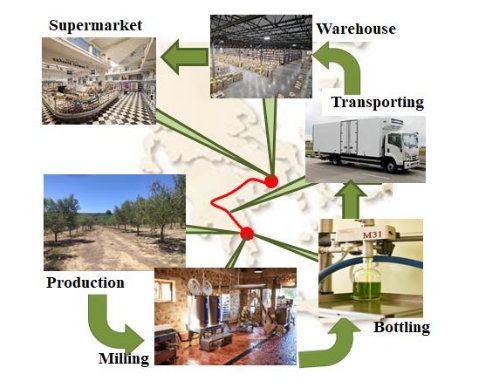This use case will combine multiple types of ground micro-climate/soil/leaf information stations, RFID readers and logistic information ensuring traceability and end-to-end cybersecurity to overcome potential attacks and threats.
Smart Farming and FinTech/Logistics Supply Chain

Use case Applications
- Develop an auditing mechanism to safeguard accountability based on evidence and not only trust: CyberNEMO will offer an audit service to identify and verify points of failure affecting product quality. The use case will initially monitor the growing conditions of an organic Olive trees’ plantation (using sensors, drones and agri- robots with multispectral cameras), the collection, milling of extra virgin oil with the highest quality standards, bottling, storage and transportation conditions to the selling point. Then it will enable stakeholders and consumers to trace the origins of products, the specific stages they’ve traversed, and identifying any potential products that might be affected in instances of quality-related issues, among other capabilities, thus, increase transparency and trust in auditing processes in cases of safety/quality issues and disputes among the companies of the food supply chain.
- Secure and traceable smart F2F trading: Based on different modules of the ZTNA, different types of digital twins (implemented over interoperable DLTs), and leveraging on information sharing (SAAM) we plan to experiment with cybersecurity and privacy protecting federation of otherwise siloed IoT platforms and to establish a distributed and immutable data management case that makes traceability and quality control of transported products more robust and reliable. CyberNEMO will empower FinTech trading features within the supply chain in an automated, trusted, and decentralised way, granting security, transparency, and traceability, with the effect of increasing a healthy competition among the participating actors. The supply chain actors (buyers and sellers) will be able to agree on the terms of the trade, perform payments, and verify that the trade has been carried out successfully with as little user interaction as possible. The component will also provide auditability for potential dispute resolutions.
